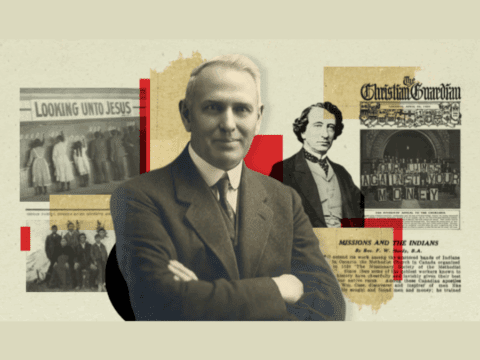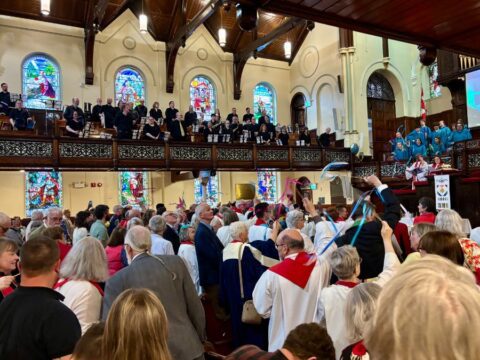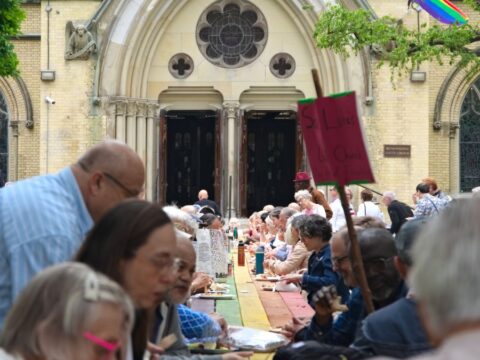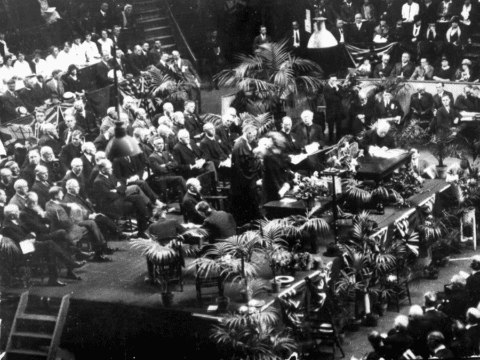In the summer of 1970, when I was a journalist for the Globe and Mail, I began to research a subject that always struck me as a window on the caring nature of society: what happens to a person who dies penniless and friendless? Gathering material for the story would lead to one of the most startling experiences of my life.
A funeral director who looked after many such situations agreed to co-operate as a source for the article. One day he called me: an elderly veteran, poor and alone, had died. I went to the funeral chapel, where I met the officiating clergy, a retired former military padre who, like me, was also an ordained United Church minister. Other than an artist engaged by the paper who stayed well back doing sketches, I was the only person there. Midway through the meditation, the aged minister recited a line of poetry I cannot forget: “Let me take happy memories as I go —” With that, his eyes met mine, then flickered. He fell. I rushed up to help, but he was already dead.
It was both shocking and sad. The funeral director was most upset. His eyes filled with tears as an ambulance took his friend away. I stood back. But slowly I decided to do something he must have thought odd: I placed my hand on his shoulder and mentioned I wasn’t just a journalist. I ended up finishing the service, driving to the cemetery and conducting the committal.
I was torn about what to do with the article. I called my friend, Very Rev. Ernest Marshall Howse, who was not only a former moderator of the United Church but also a writer. “Write it just as it happened, Ken,” he said, “because if you went a thousand times to do an article around death, what happened today would never happen again.” So I wrote the article as a letter to the deceased: “I buried you, Harry, but I didn’t expect to. And now I’m putting it all down here. . . .”
The experience stuck with me as a vivid reminder of something I have always tried to keep in focus: I am a minister. Even when I am working as a journalist, I am a minister.
Journalism is in some ways not that far removed from the ministry. The epistles of Paul are distinctly journalistic. In bygone times, news organizations sought out ministers, priests and rabbis as editorial writers because they were trained to advance a point of view with clarity and conviction.
I got my start at the Globe and Mail writing editorials. I didn’t write editorials on global economics or foreign affairs. I wrote on social, civic and human issues — and naturally, religion’s role in the public sphere. The editor-in-chief, the legendary Richard J. Doyle, felt churches had a place in public policy but was wary of them having too much influence. This occasionally led to debates between Doyle and me. Later, as we passed in the newsroom, he would sometimes smile sardonically and murmur, “Thank you for your contribution . . . pastor.”
After he retired, Doyle was appointed to the Senate and wrote his memoirs. One afternoon in April 2003, I received a phone call, not as a journalist but as a minister. Doyle had died. A few days later, in the chapel of Trinity College at the University of Toronto, before a congregation mostly of political and media people, I officiated at his funeral.
Like me, the people profiled below may have branched out into different walks of life, but they have never really left the ministry. After all, being a minister in spheres beyond the congregation is entirely consistent with the church’s theological foundations. Rev. Peter Wyatt, past principal of Emmanuel College in Toronto, cites postwar theologian Richard Niebuhr’s five models of Christian response to culture. Among the relationships Niebuhr describes, says Wyatt, “the most representative of our reform-church point of view is that of transformation. Our faith is indeed about life, but in particular about the transforming presence of God in that life.” Ministers can trade the pulpit for other occupations, but they carry that transforming presence wherever life takes them.
Rev. Bill Blaikie
Resides: Winnipeg
Occupation: Retired politician, theology professor
Rev. Bill Blaikie was first elected to Parliament in 1979 and subsequently re-elected a remarkable eight times. Until he retired from federal politics in 2008, he was the longest continuously serving member of Parliament in the House of Commons.
Blaikie, runner-up to Jack Layton in the New Democratic Party’s 2003 leadership campaign, is now an adjunct professor of theology at the University of Winnipeg and author of a fine memoir, The Blaikie Report: An Insider’s Look at Faith and Politics.
Former Conservative prime minister Joe Clark once described Blaikie as “a clear example of how significantly one person can advance the public interest.” Brian Mulroney, in his memoir, ranks Blaikie among MPs who “fought for their beliefs but did so fairly.”
How did this United Church minister manage to be an effective MP without succumbing to the nastiness that so often taints parliamentary debate? “The challenge,” he replied over coffee recently, “is to comport oneself in such a way that opponents can develop an affinity and respect for you, even though they disagree with you.”
Blaikie comes from a long line of clergy who served in the ranks of the NDP and its predecessor, the CCF. His tenets today remain as firm as they were in the House of Commons: the road to social justice is socialism. “If you’re going to allow the market to run things,” he says, “you are not going to get social justice.” He continues, “We have a much less mixed economy than when I was first elected. I’d like to have a mixed economy, but I’d like the mix to be less corporate and more co-operative.”
Rev. Marilyn MacDonald
Resides: Milford, N.S.
Occupation: Various
Marilyn MacDonald has had a remarkably diverse career. Among her vocations: Salvation Army commissioned officer, agriculturalist, supervisor in the Nova Scotia School for Girls, member of Prime Minister Lester Pearson’s economic advisory staff, adult educator, motor mechanic. In 1980, she added United Church minister to the list, serving in several pastorates (but pausing to run a printing business in the late 1980s).
“I’ve sometimes felt that having such a variety of experiences in the working world has, in a sense, allowed me to ‘speak in many tongues,’” she says.
Her occupations have shaped her ministry, and ministry has informed her occupations. In the pulpit and outside the pulpit, she strives to enable others to be as effective as they can be.
MacDonald is currently back in a pulpit again as a part-time minister in a rural Nova Scotia charge. Of all her job titles, she especially cherishes the honour of being a minister.
“The extreme privilege afforded one because of ‘the collar’ is beyond words to express. One is able to share at a very deep level with people who recognize and accept the role,” MacDonald reflects.
Rev. Walter McLean
Resides: Waterloo, Ont.
Occupation: Retired politician
One evening in late 1978, Rev. Walter McLean sat in his living room in Waterloo, Ont., with members of his congregation. The atmosphere was expectant. “I’ve been approached by some community leaders,” McLean said, “to seek the local Progressive Conservative federal nomination.” There were smiles all around, even from some who belonged to other parties. “If I’d told them I was leaving the ministry, it would have been much different, but all those people knew from my approach to the ministry that my entry into politics would be a continuation of that ministry,” he says.
From his early days as a student for the Presbyterian ministry, McLean had been active in public life. In 1959, he became the first person from Knox College to be elected president of the University of Toronto’s Student Administrative Council. In the early 1960s, McLean and his wife, Barbara, served as Presbyterian missionaries in Nigeria. As a pastoral minister back in Canada, he spent many hours in causes beyond his regular congregational duties, among them the Mennonite Central Committee and Canadian University Service Overseas.
His political career lasted from 1979 to 1993, during which McLean held positions in the federal cabinet with responsibility for human rights, immigration and the status of women.
In the mid-1990s, in recognition of his work in Canada in the anti-apartheid movement, Namibia named him honorary consul in Canada. He maintains a strong interest in African development issues. “Our tradition,” he says quietly, “has always believed that ministry isn’t confined to the institutional church.”
He has one guiding principle: “The greatest satisfaction of my career is that it was a journey in God’s presence, a gift of God, to be valued and used for God.”
James Lawson
Resides: Toronto
Occupation: Retired bank executive
To me, the ministry was always about people,” says James Lawson. That was the reason for a big decision he made in 1974. After serving three United Church pastorates, he began to look at what he might do beyond the institutional church to further his conviction that people matter the most. He entered banking and before long became a human resources executive at the Toronto-Dominion Bank. He’s now retired but very involved in a Toronto congregation. He smiles as he reflects on his decision to leave the pulpit. “That decision gave me a great opportunity. I was able to emphasize my faith and apply my talents.”
As a banker, Lawson oversaw Toronto-Dominion’s employee, labour and government relations, as well as the promotion of women and treatment of people with disabilities. “One of the main questions I always had in mind,” he says, “was how can we make the workplace a really good place, one where people want to work every day?” This approach led to the creation of a program to help employees cope with problems like alcohol and drug addiction, as well as marital troubles. “It was very carefully done,” he recalls, “at no cost to the person and fully confidential.”
In time, he was able to apply his convictions even more broadly; he became president of a national employers’ council and represented Canadian employers at the International Labour Organization, a United Nations agency responsible for global workplace issues, including child labour, health and safety, and the exploitation of women. “It meant much travel and sometimes dealing with dreadful issues,” Lawson says. “But looking back, I’d say we improved things. So I’m glad I made the decision in 1974. I was able therefore to do what I wanted to do as a minister, but more widely.”
John Patterson
Resides: Haliburton, Ont.
Occupation: Retired entrepreneur
Some liberal Christians are wary about business, believing that it’s based on greed and ruthlessless. John Patterson, ordained to the United Church ministry in the 1960s, shatters the stereotype. Kanbay International Inc., the information technology company he and two partners founded in the late 1980s, was highly regarded for its progressive policies toward its 7,000 employees in India, Japan, Hong Kong, Singapore, Australia and the United States.
Patterson, a minister’s son, says he had no entrepreneurial ambition as a young man. After ordination, he served a few years in the pastorate, then moved to Chicago to continue his education at McCormick Theological Seminary. It was a life-changing decision. At McCormick, Patterson and his wife, Thea, became intrigued by a fresh approach to what he calls “church renewal and church service to the world.” They worked for a time in community development in India, living very modestly. Eventually Patterson and two colleagues who had also worked in the developing world decided they had to do something more to support their families. They founded a software company and called it Kanbay — “Kan” for Canada, “bay” for Bombay.
“There was,” Patterson recalls, “a very steep learning curve.” But he rose to the challenge. In the early years, he took no salary; Thea worked to support the family. Eventually, Kanbay thrived, with Patterson serving as its regional director for Asia-Pacific, based in Hong Kong. In 2006, the company was sold to the French information technology giant Capgemini, and the Pattersons returned to Canada.
Retirement has been an active time for both John and Thea. They occasionally open their large home in central Ontario’s Haliburton Highlands to church seminars and retreats, and to groups exploring issues such as HIV-AIDS, care for the environment and the delegitimization of war. It’s all done with fond memories of their years abroad with Kanbay. “It’s gratifying,” John Patterson says, “to know a company can operate out of high values and respect for the many cultures that are part of it.”
Rev. Anne Simmonds
Resides: Toronto
Occupation: Therapist
The people who make their way to Rev. Anne Simmonds’s comfortable home in a leafy east-end Toronto neighbourhood might be teachers or businesspeople. A few might even be clergy. Most of them are in distress. Simmonds, an ordained minister-turned-therapist, tries to help them.
The soft-spoken Simmonds was born into a Baptist family and educated in Anglican and Catholic colleges, but she chose the United Church as her spiritual home. “I just felt it was where I belonged,” she says, “and I was right.”
Along with nursing and divinity degrees, she holds a doctorate in ministry from Emmanuel College in Toronto, where she specialized in pastoral care for the dying. She spent over a decade as a palliative care chaplain in a major Toronto hospital.
In time, Simmonds put her experience to work more widely. “I wanted to bring what I learned in the land of the dying to the land of the living,” she says. She’s had lots of practical help from what she calls “the workshop of life.” One important lesson is to tread carefully with her secular clients. “I’ve had to take every word of traditional religious language, like ‘sin’ and ‘redemption,’ and re-appropriate them to ordinary language. The moment you speak in so-called God-talk, the person’s eyes glaze over.”
Outside the office, Simmonds runs workshops across Canada. Some are designed to help people deal with changing times, others about handling grief. Recently, she’s taken it a step further, meeting with clients online via Skype.
Whatever the approach, the words of French Jesuit theologian Pierre Teilhard de Chardin inform her work day in and day out: “We are not human beings having a spiritual experience; we are spiritual beings having a human experience.”
Rev. Rob Oliphant
Resides: Toronto
Occupation: Politician, non-profit CEO
Rob Oliphant began his working life in 1978 as an accountant and computer systems developer with one of Canada’s biggest steel companies. In the mid-1980s, he changed direction, earning a divinity degree and entering the United Church’s ordered ministry. By the end of the decade, he was working as an adviser to former Ontario premier David Peterson, and a decade later, was back in a pulpit in one of the United Church’s biggest congregations, Eglinton St. George’s United in midtown Toronto.
From a young age, Oliphant had been active in the Liberal Party. In 2008, he announced he would seek the Liberal nomination in the federal riding of Don Valley West, Ont. He won and was elected to the House of Commons later that year, serving for three years before losing his seat in the 2011 general election.
Politics can be a toxic business — maybe not the best environment for a member of the clergy. Yet Oliphant thrived in his brief tenure in Ottawa, named to the shadow cabinets of Stéphane Dion and Michael Ignatieff as the party’s critic for veterans’ affairs and multiculturalism. “In the long run,” he says, “it was my background in the clergy that garnered the most respect. If I was asked if I might be there to promote my religious perspective, I replied that my religious perspective is one that leads me to do my best for the wide community.”
Oliphant takes his ordination to the ministry seriously. “Jesus didn’t come into the church,” he says. “He came into the world. He came that all might see the world through him.” In elected life, the people of his riding became his parishioners. Now, as president and CEO of the Asthma Society of Canada, he’s working to make life better for the 2.7 million Canadians who suffer from the respiratory condition. “I want to help them,” he says, “not just to live longer but to live fuller lives. That’s my ministry. And yes, I still preach — twice last month.”
Rev. Norman Whitney
Resides: Fredericton
Occupation: Biologist
A document prepared in 2006 when Norman Whitney was awarded the Order of Canada describes him as “one of Canada’s leading plant and forest pathologists.” Now in his 80s, Whitney is a professor emeritus of biology at the University of New Brunswick (UNB). Yet for almost his entire adult life, Whitney was also a United Church minister, preaching in rural churches around Fredericton.
Whitney grew up near Calgary. “I was fascinated watching fish jump and flowers grow,” he remembers. In time, he earned a doctorate in biology and a government post in Alberta. But in January 1961, he had a life-changing moment. He was preparing a Sunday school lesson when it happened: “I felt what I always call ‘the tap on the shoulder,’ the call to the ministry. It was unmistakable,” he says.
The tap led to a McGill theology degree, ordination and a pastorate near Fredericton. But Whitney did not turn his back on his passion for science. He became a lecturer at UNB, a doctoral supervisor and a campus counsellor. In 1985, he was promoted to a full professorship in biology and later accepted an appointment to the university’s forest resources department. Throughout his academic career, he continued to minister at nearby rural churches.
Whitney still teaches two courses and remains a counsellor. He also played hockey until he was 80, making him one of Canada’s oldest active hockey players at the time.
A recent telephone chat ended with Whitney asking an interviewer to stay on the line just a bit longer. “I want,” he said, “to sing you a hymn, one verse.” So Norman Whitney, scientist, minister and member of the Order of Canada, joyously sang the following: “Eternal light, shine in my heart. / Eternal hope, lift up my eyes. / Eternal power, be my support. / Eternal wisdom, make me wise. Amen.”
***
This story first appeared in The United Church Observer’s September 2012 issue with the title “Once a minister…”
















Very engaging
At least half of the names known to me as an 83 year old
A great reminder that the beloved work is done outside the Church walls
Thank you for reminding us